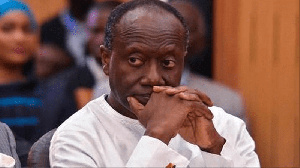Worldwide, economy is currently experiencing a change. From one day to the next, the indomie you had bought for twelve cedis just yesterday suddenly costs 15 cedis. The fuel prices have been a subject of complaint for quite some time now.
It can no longer be overlooked: inflation has hit Ghana, and the country is suffering from it. The inflation rate lies at shocking 37 percent at the moment. People’s businesses are collapsing, the prices fluctuate on the daily.
Now, over 80 NPP members of parliament have spoken out on the issue and pressured the government to take action. The plan is not only to get IMF to support the country to stabilize the economy, but also to make place for a new finance minister instead of Ken Ofori-Atta. The movement’s speaker announced: “We are by this medium communicating a strong desire that the president changes the minister of finance and the minister of state in the finance ministry without further delay, in order to restore hope into the financial sector and reverse the downward trend in the groove of the economy.”
On e.TV Ghana’s “fact sheet”, host Samuel Eshun talked about the situation live on Tuesday at 8pm. Will a new finance minister be able to handle the crisis? Will he build the needed confidence to ensure that international partners and investors will have trust in Ghana’s economy?
To discuss the issue, Joseph Obeng, president of GUTA, was invited to the show. In his opinion, the situation represents a world-wide problem. “It is a global phenomenon”, he says. And he criticizes Ghana’s way of handling the inflation: “We do not know how to appoint and dismiss. What we know is how to complain.”
Prof. Edward Brenya from the history and political science department at KNUST comments on the situation: “I feel strongly that the call is in the right direction, and I am hoping that the members of parliament who are making the call will not just be throwing dust in the eyes of Ghanaians, but they will walk the talk.” He does not worry about the number of people initiating this change; on the contrary: He believes that they are more than enough to force the government to act – because parliament is about voting. “The important thing is that the majority of the members of parliament of the ruling government are telling the government that things are not right.”, he says.
Financial analyst and banker Christian Tachie-Djan explains that the life standard in Ghana will get more and more expensive. Not only does the economy go down, but consumers also need to pay more for electricity and water. The Bank of Ghana policy rate that was reviewed is currently at 24 percent, which causes the cost of borrowing to increase. Because of the downgrades that Ghana has experienced, people are now unable to go to the capital market to borrow. “All of these things have put us in a situation where things have become very unbearable.”, he says. He further explains that all these issues stop at the finance minister’s doorstep.
According to Tachie-Djan, a change in the ministry would “breathe a new energy into the system”, so that the calmness and trust will be restored. He sees a potential danger in Ghanaians losing confidence in the country’s economics and therefore chasing the US dollar. A new finance minister would solve that issue in his eyes. He emphasizes that it is important for the minister to be supported and for his work to be continued. The ministry needs to build a strong team in order to pick up the pieces and ensure that Ghana regains its position as economic powerhouse in the sub-region. This way, the system would not suffer but profit from a replacement.
The Bank of Ghana and the ministry are difficult to isolate in the banker’s opinion, since they play into each other’s hands. Tachie-Djan believes that both parties would benefit from a replacement of the minister. “Speculation is key here, and it’s very important that we send a message across the FX market for people to regain or have confidence in the economic system and they will stop chasing after the dollar.”






